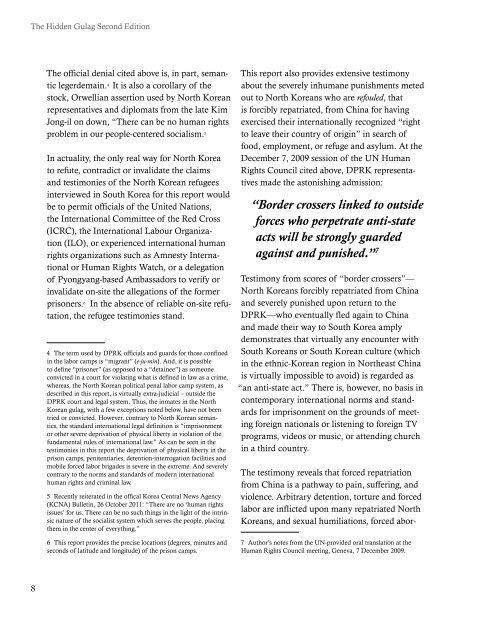The Hidden Gulag - US Committee for Human Rights in North Korea
The Hidden Gulag - US Committee for Human Rights in North Korea
The Hidden Gulag - US Committee for Human Rights in North Korea
You also want an ePaper? Increase the reach of your titles
YUMPU automatically turns print PDFs into web optimized ePapers that Google loves.
<strong>The</strong> <strong>Hidden</strong> <strong>Gulag</strong> Second Edition<strong>The</strong> official denial cited above is, <strong>in</strong> part, semanticlegerdema<strong>in</strong>. 4 It is also a corollary of thestock, Orwellian assertion used by <strong>North</strong> <strong>Korea</strong>nrepresentatives and diplomats from the late KimJong-il on down, “<strong>The</strong>re can be no human rightsproblem <strong>in</strong> our people-centered socialism. 5In actuality, the only real way <strong>for</strong> <strong>North</strong> <strong>Korea</strong>to refute, contradict or <strong>in</strong>validate the claimsand testimonies of the <strong>North</strong> <strong>Korea</strong>n refugees<strong>in</strong>terviewed <strong>in</strong> South <strong>Korea</strong> <strong>for</strong> this report wouldbe to permit officials of the United Nations,the International <strong>Committee</strong> of the Red Cross(ICRC), the International Labour Organization(ILO), or experienced <strong>in</strong>ternational humanrights organizations such as Amnesty Internationalor <strong>Human</strong> <strong>Rights</strong> Watch, or a delegationof Pyongyang-based Ambassadors to verify or<strong>in</strong>validate on-site the allegations of the <strong>for</strong>merprisoners. 6 In the absence of reliable on-site refutation,the refugee testimonies stand.4 <strong>The</strong> term used by DPRK officials and guards <strong>for</strong> those conf<strong>in</strong>ed<strong>in</strong> the labor camps is “migrant” (e-ju-m<strong>in</strong>). And, it is possibleto def<strong>in</strong>e “prisoner” (as opposed to a “deta<strong>in</strong>ee”) as someoneconvicted <strong>in</strong> a court <strong>for</strong> violat<strong>in</strong>g what is def<strong>in</strong>ed <strong>in</strong> law as a crime,whereas, the <strong>North</strong> <strong>Korea</strong>n political penal labor camp system, asdescribed <strong>in</strong> this report, is virtually extra-judicial – outside theDPRK court and legal system. Thus, the <strong>in</strong>mates <strong>in</strong> the <strong>North</strong><strong>Korea</strong>n gulag, with a few exceptions noted below, have not beentried or convicted. However, contrary to <strong>North</strong> <strong>Korea</strong>n semantics,the standard <strong>in</strong>ternational legal def<strong>in</strong>ition is “imprisonmentor other severe deprivation of physical liberty <strong>in</strong> violation of thefundamental rules of <strong>in</strong>ternational law.” As can be seen <strong>in</strong> thetestimonies <strong>in</strong> this report the deprivation of physical liberty <strong>in</strong> theprison camps, penitentiaries, detention-<strong>in</strong>terrogation facilities andmobile <strong>for</strong>ced labor brigades is severe <strong>in</strong> the extreme. And severelycontrary to the norms and standards of modern <strong>in</strong>ternationalhuman rights and crim<strong>in</strong>al law.5 Recently reiterated <strong>in</strong> the offical <strong>Korea</strong> Central News Agency(KCNA) Bullet<strong>in</strong>, 26 October 2011: “<strong>The</strong>re are no ‘human rightsissues’ <strong>for</strong> us. <strong>The</strong>re can be no such th<strong>in</strong>gs <strong>in</strong> the light of the <strong>in</strong>tr<strong>in</strong>sicnature of the socialist system which serves the people, plac<strong>in</strong>gthem <strong>in</strong> the center of everyth<strong>in</strong>g.”6 This report provides the precise locations (degrees, m<strong>in</strong>utes andseconds of latitude and longitude) of the prison camps.This report also provides extensive testimonyabout the severely <strong>in</strong>humane punishments metedout to <strong>North</strong> <strong>Korea</strong>ns who are refouled, thatis <strong>for</strong>cibly repatriated, from Ch<strong>in</strong>a <strong>for</strong> hav<strong>in</strong>gexercised their <strong>in</strong>ternationally recognized “rightto leave their country of orig<strong>in</strong>” <strong>in</strong> search offood, employment, or refuge and asylum. At theDecember 7, 2009 session of the UN <strong>Human</strong><strong>Rights</strong> Council cited above, DPRK representativesmade the astonish<strong>in</strong>g admission:“Border crossers l<strong>in</strong>ked to outside<strong>for</strong>ces who perpetrate anti-stateacts will be strongly guardedaga<strong>in</strong>st and punished.” 7Testimony from scores of “border crossers”—<strong>North</strong> <strong>Korea</strong>ns <strong>for</strong>cibly repatriated from Ch<strong>in</strong>aand severely punished upon return to theDPRK—who eventually fled aga<strong>in</strong> to Ch<strong>in</strong>aand made their way to South <strong>Korea</strong> amplydemonstrates that virtually any encounter withSouth <strong>Korea</strong>ns or South <strong>Korea</strong>n culture (which<strong>in</strong> the ethnic-<strong>Korea</strong>n region <strong>in</strong> <strong>North</strong>east Ch<strong>in</strong>ais virtually impossible to avoid) is regarded as“an anti-state act.” <strong>The</strong>re is, however, no basis <strong>in</strong>contemporary <strong>in</strong>ternational norms and standards<strong>for</strong> imprisonment on the grounds of meet<strong>in</strong>g<strong>for</strong>eign nationals or listen<strong>in</strong>g to <strong>for</strong>eign TVprograms, videos or music, or attend<strong>in</strong>g church<strong>in</strong> a third country.<strong>The</strong> testimony reveals that <strong>for</strong>ced repatriationfrom Ch<strong>in</strong>a is a pathway to pa<strong>in</strong>, suffer<strong>in</strong>g, andviolence. Arbitrary detention, torture and <strong>for</strong>cedlabor are <strong>in</strong>flicted upon many repatriated <strong>North</strong><strong>Korea</strong>ns, and sexual humiliations, <strong>for</strong>ced abor-7 Author’s notes from the UN-provided oral translation at the<strong>Human</strong> <strong>Rights</strong> Council meet<strong>in</strong>g, Geneva, 7 December 2009.8



